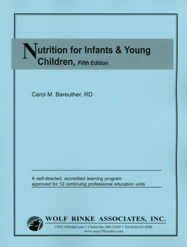|
|
|
|||||||||||||||||||
|
CPE Home Page List of All Courses/Programs
Share a Program: Order Form FREE:Read & Grow Rich
|
||||||||||||||||||||
Manual with 1 reporting form, 145 pgs.
For more information and customer comments, click here. For RDs/RDNs & DTRs/NDTRs for the Professional Development
Portfolio
Share with a friend and Save! Click here for important information about
sharing.
Nutrition for Infants &
Young Children, Fifth Edition © 2013 Wolf Rinke Associates. All rights reserved for this self-directed accredited learning program. Reproduction in whole or part without written permission, except for brief excerpts, is prohibited. Customer Comments Cecilia Tam: "This course was very thorough and easy to understand. It provided very practical and useful information. I enjoyed it very much!" Charlotte Olask: "Great Variety of information-very complete. I work for a WIC Program & this will up my skillset." Karen Knechtl: "It was very complete, covered everything you might need. From resources for vegetarian meal planning for children to more technical lab and kcal calculations. What an awesome course!" Sally Johnson: "Easy to read. Interesting. Well organized." Stephanie Collins: "Very well organized." Marilyn Shulman: "Good sound advice, clear and concise information that can be used with public health." Christine Settino: "Now that I'm the mother of a 10 month old and another on the way, I have a big interest in proper childhood nutrition. This was an excellent program, very easy to read, informative and interesting. I read it from beginning to end in just one day!" Dawn Kern: "This course was my favorite." Sunday Long, RD: "The material is written in a simple manner that is easily understood." Stephanie Jacobson: "Very well written, easy to understand, a fast read." Bernie Keller: "Easy reference charts that can be used as desktop reference guides." Annette Witter: "I liked all the organized info in the appendixes. I liked the examples/case studies used to explain formulas and calculations." Donna Christman: "Well written. A lot of information." Lee Anna Stock: "This course is very interesting and very specific. The entire content of the book is useful information, especially the appendixes." Amanda Vdoviak: "The information was well organized and clearly written so I was able to get the facts without a lot of extra un-needed information." Mary Grieb: "It was very applicable to actual practice not just theory." Courtney R. Goff: "It was an excellent course! Very well organized. I feel so much more confident on this topic now. I look forward to applying it with my baby girl." OVERVIEW AND INTRODUCTION Welcome to Nutrition for Infants and Young Children, 5th Edition, a pre-approved, accredited Continuing Professional Education self-study program (CPE program).Providing nutritional care for infants and young children presents a unique challenge. These tiny tots need the proper quality and quantity of nutrients to fuel dynamic growth and development processes and build both strong bodies and good eating habits to last a lifetime. At the same time, provision of nutrients is limited by children's developing physiology and physical abilities. Challenges range from assuring that a newborn that can only suck gets an adequate amount of breast milk or formula to formulating a meal plan for an underweight preschooler who is frustrated by his lack of dexterity in handling a spoon. Successfully steering infants and young children through this demanding time brings the unequaled reward of seeing little smiles beam bright from the glow of good nutrition. This CPE program will provide you with detailed information that will enable you to care for infants and young children, including:
This CPE program is designed to help you earn 12 continuing professional education units (CPEUs). It is a Level 2 CPE program, meaning that the reader has general knowledge of the literature and professional practice in the area(s) covered. The focus of the program is to enhance knowledge and application.
or fax it to: (410) 531-9282, or mail it to: Wolf Rinke Associates, 721 Valley Forge Road #486, Valley Forge, PA 19481 We will email your Certificate of Completion. When you submit your CPE Reporting Form to us via www.easyCPEcredits.com fax or mail, be sure to write your correct email address in the space provided on the CPE Reporting Form. If writing by hand, be sure to print your email address clearly. To ensure that our emails are delivered to your inbox (instead of your junk/spam folders), please add cpesupport@wolfrinke.com to your Address Book or Safe List of allowed email senders. Also, be sure to allow attachments from this email address. Happy Learning! GOAL OBJECTIVES
TABLE OF CONTENTS Chapter I: Infants: Birth to 1 Year GROWTH AND DEVELOPMENT Growth Rate Developmental Milestones NUTRIENT NEEDS Carbohydrates Fat Protein Calories Vitamins and Minerals Water FULFILLING NUTRIENT NEEDS Breast Milk Commercial Infant Formulas Whole Cow's Milk Introduction of Solids NUTRITIONAL ASSESSMENT Anthropometric Biochemical Clinical Assessment Dietary Evaluation CASE STUDY: THE CASE OF THE SHRINKING INFANT
Chapter II: Children 1 To 6 Years GROWTH AND DEVELOPMENT Growth Rate Developmental Milestones NUTRIENT NEEDS Calories Calcium Dietary Fiber Vitamin E Folate Iron Magnesium Potassium Supplements Fluids FULFILLING NUTRIENT NEEDS Basic Meal Plan Snacks Common Feeding Problems and Solutions Choking Feeding the Hospitalized Child NUTRITION ASSESSMENT Anthropometrics Biochemical Clinical Assessment Dietary Evaluation CASE STUDY: THE "FOOD IS LOVE" CAPER
Chapter III: Special Needs AIDS ALLERGIES DENTAL HEALTH DEVELOPMENTAL DISABILITIES DIABETES MELLITUS DIARRHEA AND CONSTIPATION DIET AND BEHAVIOR ENTERAL/PARENTERAL NUTRITION SUPPORT Enteral Feedings Parenteral Feedings LACTOSE INTOLERANCE VEGETARIAN DIETS
Appendices References For Your Continued Learning Resources List of Abbreviations Glossary Self-Assessment Questions Answer Key Explanation to Questions ABOUT THE AUTHOR About Wolf Rinke Associates, Inc. If you prefer to order by phone, mail or fax click below Order Formor click here to contact us with other questions. For information about our other products and services return to the sidebar at the top of the page. |
||||||||||||||||||||

